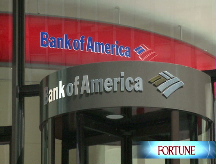Banks get bashed again
Bad news about the economy overshadowed modest progress at Citi and Bank of America. Bank stocks fell anew even as the broader market posted a modest gain.


NEW YORK (Fortune) -- Bank stocks swooned for the seventh time in eight days Friday, as the news of another big setback in the economy overshadowed some modest progress in the restructuring of the troubled financial sector.
Bank of America (BAC, Fortune 500) tumbled 14%, reversing an earlier 12% gain after the company confirmed it would receive $138 billion in government aid for its purchase of Merrill Lynch.
Other banks tumbled as well: Citigroup (C, Fortune 500), which early Friday posted a big fourth-quarter loss and set plans to split itself in two, dropped 9% after earlier rising as much as 17%.
JPMorgan Chase (JPM, Fortune 500) dropped 7%, a day after it posted a sharp fourth-quarter profit decline, and Wells Fargo (WFC, Fortune 500) -- which is due to post fourth-quarter numbers on Jan. 28 - slid 7% to a seven-year low.
These stocks all rose in early trading Friday, following the announcement of plans for a restructuring at Citi and renewed government support of Bank of America.
But those developments hardly offered investors an incentive to bet on a sector that has been in steep decline for more than a year.
Friday's announcement by that electronics retailer Circuit City would liquidate, potentially eliminating 34,000 jobs, reminded investors of a worrying trend in the fourth-quarter profit reports delivered by BofA, Citi and JPMorgan: With unemployment rising, bad loans are piling up, and there's no end in sight.
"The U.S. is in a severe recession affecting all sectors of the economy," Bank of America chief Ken Lewis said on a Friday morning conference call with investors.
He said economic challenges would be "a challenge throughout 2009," with unemployment topping 8% and losses on BofA's credit card loans rising even beyond that. Historically, credit card charge-offs have been around the same level as the unemployment rate.
Lewis said he hopes to see "early signs of stabilization" in the second half of 2009. In the meantime, the bank and its rivals have been sharply increasing their reserves for potential loan losses -- which is part of the reason the big banks' profit reports have looked so ugly.
Citi said its fourth-quarter loss of $8.3 billion reflected $6 billion of additions to its loan loss reserves. Bank of America lost $1.79 billion for its fourth quarter, including an addition of $3 billion in reserves. JPMorgan Chase, which managed to eke out a profit of $702 million in its latest quarter, added $4.1 billion to its loan loss reserves.
Analysts expect to see more of the same from other banks, including San Francisco-based Wells. Like JPMorgan Chase, Wells has been seen as one of the healthiest U.S. banks. In October it snapped up troubled Charlotte, N.C.-based Wachovia for $13 billion, adding Wachovia's big Southeastern retail network and its $448 billion in deposits to Wells' Northern California base.
The deal gives Wells expanded access to cheap deposit funding -- a must at a time when market stresses have made wholesale funding expensive and hard to come by. But it also further increased Wells' exposure to the troubled California real estate markets due to Wachovia's disastrous purchase of the Oakland-based savings and loan Golden West Financial in 2006.
Citigroup Investment Research analyst Keith Horowitz noted as much Wednesday, when he cut his target price for Wells to $23 from $25. Wells shares, which fetched $25 apiece as recently as Monday, were trading below $18 on Friday.
Horowitz said the risk that the real estate bust will deepen could force Wells to cut its dividend, which at $1.36 a share annually costs the company around $1 billion a quarter.
Citi and BofA have both slashed their quarterly payout to a penny per share to preserve capital.
Horowitz noted that Wells has more of its loans in real estate than its peers, and greater dependence on mortgage revenue.
"We view Wells Fargo as one of the better managed companies in the bank sector," wrote Horowitz, who rates the stock a "hold", "but believe due to deteriorating credit, investors can wait for a more attractive entry point."
Judging by the free fall of banking stocks, it seems a lot of investors are doing just that. ![]()
-
 The retail giant tops the Fortune 500 for the second year in a row. Who else made the list? More
The retail giant tops the Fortune 500 for the second year in a row. Who else made the list? More -
 This group of companies is all about social networking to connect with their customers. More
This group of companies is all about social networking to connect with their customers. More -
 The fight over the cholesterol medication is keeping a generic version from hitting the market. More
The fight over the cholesterol medication is keeping a generic version from hitting the market. More -
 Bin Laden may be dead, but the terrorist group he led doesn't need his money. More
Bin Laden may be dead, but the terrorist group he led doesn't need his money. More -
 U.S. real estate might be a mess, but in other parts of the world, home prices are jumping. More
U.S. real estate might be a mess, but in other parts of the world, home prices are jumping. More -
 Libya's output is a fraction of global production, but it's crucial to the nation's economy. More
Libya's output is a fraction of global production, but it's crucial to the nation's economy. More -
 Once rates start to rise, things could get ugly fast for our neighbors to the north. More
Once rates start to rise, things could get ugly fast for our neighbors to the north. More








